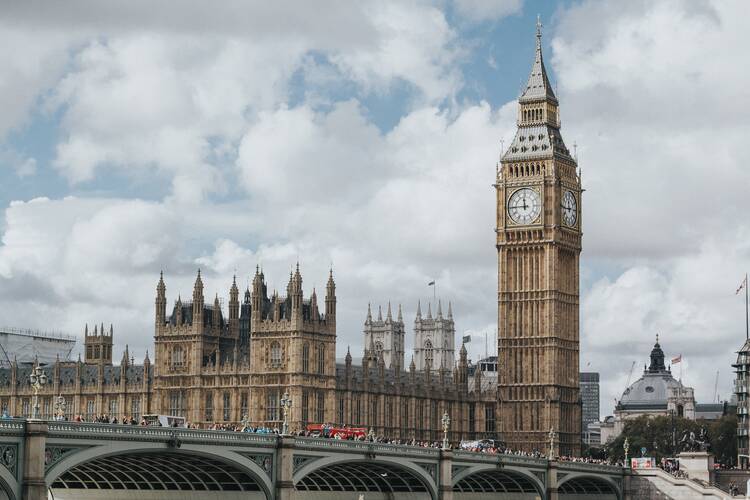LONDON (AP) — Not a lot unites Northern Ireland’s fractious political and religious groups. The British government has managed it with a law that sets out to lay the ghosts of decades of violence to rest.
All of Northern Ireland's major political parties, Catholic and Protestant churches, human rights organizations and the United Nations opposed the Legacy and Reconciliation Bill, which passed its final hurdle in Parliament late Tuesday.
The legislation will stop most prosecutions for killings by militant groups and British soldiers during “the Troubles,” three decades of violence in which more than 3,500 people died.
The legislation will stop most prosecutions for killings by militant groups and British soldiers during “the Troubles,” three decades of violence in which more than 3,500 people died.
The 1998 Good Friday peace accord largely ended the killings. But a quarter century on, the wounds are still raw for those who lost loved ones at the hands of Irish republican and British loyalist militias and U.K. troops. Many say the new law will allow killers to get away with murder.
Kenny Donaldson, director of services at the South East Fermanagh Foundation, a victims’ group, said Troubles survivors “feel deeply offended” by the bill’s use of the words legacy and reconciliation.
“The very language — legacy, in the past — that’s society’s language. That’s not what it is for victims and survivors, because it’s their present,” Donaldson said.
“Reconciliation, real reconciliation cannot happen in this place unless we have a clear of the decks. And that requires people from right across the board to own the things that they did,” he said.
Kenny Donaldson: “Reconciliation, real reconciliation cannot happen in this place unless we have a clear of the decks. And that requires people from right across the board to own the things that they did.”
Under the terms of the 1998 peace agreement, many militants were released from prison or were not prosecuted for actions during the Troubles, a decision that long rankled people affected by the violence.
Britain’s Conservative government says the law reflects the increasingly small likelihood of convicting defendants of decades-old crimes. Instead of the courts, a new Independent Commission for Information Recovery and Reconciliation — loosely modeled on South Africa’s post-apartheid Truth and Reconciliation Commission — will investigate alleged crimes.
Former militants and soldiers who cooperate with the commission and reveal what they know about past crimes will be granted immunity from prosecution, and new civil claims and inquests over the Troubles will be banned. People who refuse to “engage meaningfully” with the commission could still be charged.
Almost no one in Northern Ireland wants to return to violence, but it remains a divided place, a part of the United Kingdom where some identify as British and some as Irish. But the institutions set up by the peace process remain fragile.
The U.K.’s exit from the European Union in 2020 sparked a political crisis that collapsed the regional power-sharing administration in Belfast and left the region without a functioning government since early 2022.
Northern Ireland's political parties are united, however, in opposing the law. Emma Little-Pengelly, legacy spokeswoman for the pro-British Democratic Unionist Party, said when the bill passed the House of Commons last week, “the government’s decision to railroad through these proposals in the face of unanimous opposition in Northern Ireland was abhorrent.” Pat Finucane of Irish nationalist party Sinn Fein accused the British government of being “cynical and cruel.”
U.K. veterans’ groups are among the few organizations to have welcomed the legislation, which lifts the threat of prosecution from troops who served in Northern Ireland.
N.I. Secretary Chris Heaton-Harris: “No one has an alternative for what could possibly replace it, and no one can tell me that the current situation that has been running for the last 25 years has been satisfactory to the families of victims either."
Members of the House of Lords, Parliament’s upper chamber, relented Tuesday on attempts to put the brakes on the bill after its passage in the elected House of Commons. It will become law after the formality of King Charles III giving royal assent. The government has not said when that would happen, but it usually comes within days of parliamentary approval.
The legislation is likely to face legal challenges. The government of the Republic of Ireland – which, like the U.K., is a guarantor of the Northern Ireland peace process – is considering taking the U.K. to the European Court of Human Rights to challenge the law. Irish Deputy Prime Minister Micheál Martin said Tuesday that he had “consistently asked the British government to pause” the legislation.
“We believe legacy policy should be victim-centered,” Martin told Irish broadcaster ITV. “That is our position, and we’re going to examine this now in terms of what further responses the Irish government will take to protect victims and to support victims.”
The British government says no one has come up with a better way to confront to the painful legacy of the Troubles.
“No one has an alternative for what could possibly replace it, and no one can tell me that the current situation that has been running for the last 25 years has been satisfactory to the families of victims either,” Northern Ireland Secretary Chris Heaton-Harris said.








